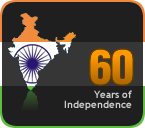On February1 we got the news of an addition to the family - the birth of a baby girl in Seattle, to my grand-children Sankar and Jaisri, a sister to Nino. It was this wonderful news for which we in Chennai were waiting with bated breath. Thanks to the modern-day facilities we were getting an on-the-spot running commentary which made us feel we were also in the same frame. Not only that, within an hour of the baby’s arrival we got a picture of the newborn and we did not have to wait long to see the baby on the web cam. The baby was born in Seattle and it was Sankar who was with Jaisri throughout the ordeal, and the first person to see and handle the baby.
Things were different and in many cases still are different in India so far as I know. Today’s children will not believe that Babuji (my husband) saw our first born when the baby was six months old. Twenty years later too it was not very different. Our eldest son-in-law also belonged to the same category. The reason was very simple. Amongst our people in South India expecting mothers were always taken to their parents’ place for the confinement period - that is the time of delivery and for some days of rest after childbirth. After three months the mother and child, went to her in-laws place for a month or so, after which only she joined her husband wherever he worked.
In the early part of the twentieth century customs and rules were different from my time. In those days men did not venture out so far from their hometown in search of jobs. Traditions and religious rites made it easier for the father also to see and take the baby in his arms as early as the twelfth day itself: it was on the twelfth day the baby had the naming ceremony, which used to be celebrated with a pooja and some religious rites done by the father. Traditions and customs were made pliable to suit the modern life style, the naming ceremony and annaprasanam (feeding the baby solid food for the first time, a ceremony usually conducted when the baby is six months old) have become a part of the first birthday celebration.
In those days unlike today it was not even thinkable that a man could enter the delivery room leave alone be there to see the baby born. In most families, the delivery was at home with the help of a midwife. An elderly, much-experienced grandmother or an aunt would be there to act the part of the nurse, to comfort the to-be-mother and hold her hand and wipe her brows. No one else was to enter the delivery room, not only at the time of the delivery but for the next ten days -- maybe to protect the newborn baby and the mother from infection of any kind.
As lifestyle changes our ideas and notions also change. Our mindset is ready to accept new ideas as well as changing norms. Today, for a father-to-be, it is a matter of one’s own choice whether to be with his wife during childbirth.
Thirty years back when my son and daughter-in-law were expecting their first child neither of the mothers from India was in a position to go to Chicago to be of any help to them. It was my son who was with his wife to give her all the support and solace she needed during the delivery. Not only that, he managed to cook the meals, do the housework and take care of the baby, like giving the baby his daily oil bath (following our family tradition, prepare his food and changing nappies, since the mother was a little apprehensive to handle the small baby for the first few days. All this he managed to do while attending to his office work too. The plus point was he was running his own business.
In India too this system has caught on and many men of today are proud to take care of their newborn babies. I wish more and more men in India too start this habit of being with their wives during the birth of their children so that they could know what the womenfolk go through and not treat childbirth as a routine job!!
Following the system in some other countries, the Japanese government has introduced paternity leave of two months. I remember having read in the papers that the Japanese prime minister was the first one to avail himself of this new rule!!
I do admire such men.















